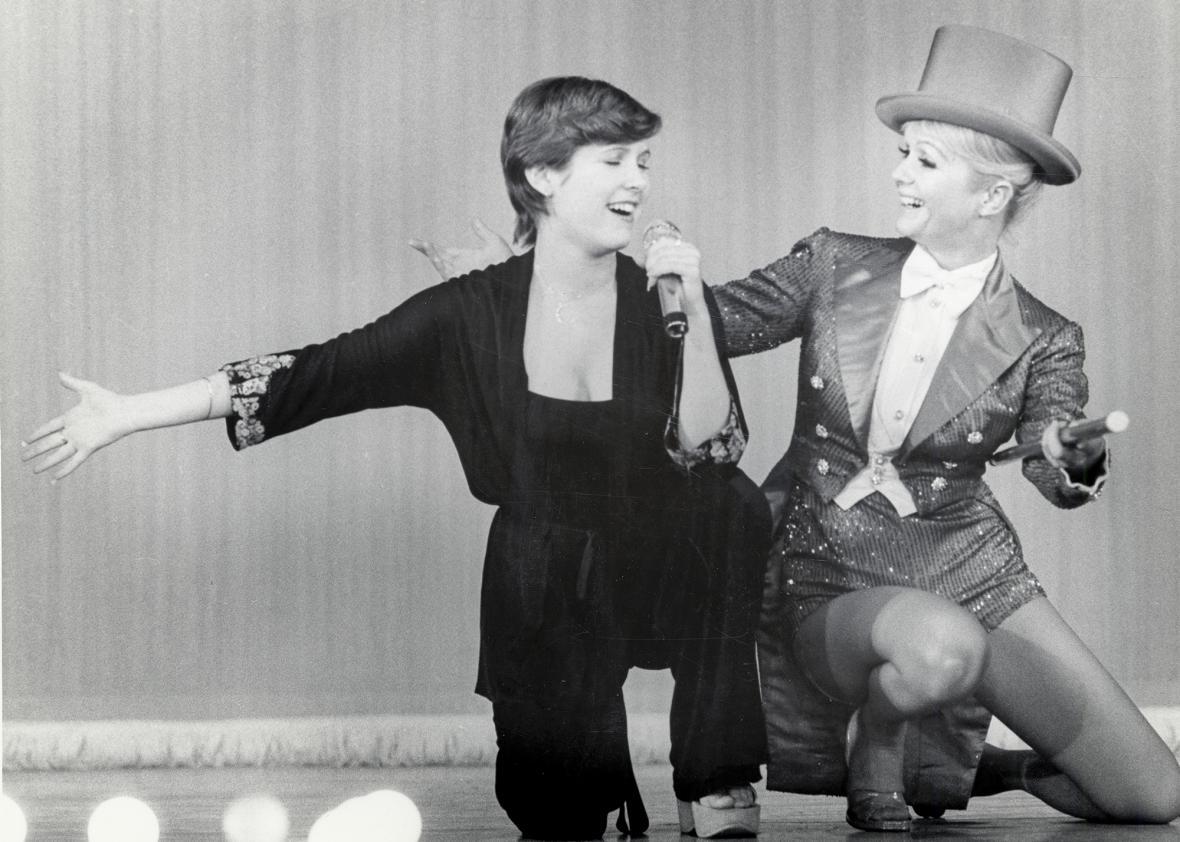Watching Alexis Bloom and Fisher Stevens’ documentary Bright Lights: Starring Carrie Fisher and Debbie Reynolds now is like attending a wake for a beloved relative you haven’t seen in a while. It’s a wonderful tribute, full of honest and heartfelt moments, but I wish to God I could’ve seen it while they were alive.
Bright Lights, whose HBO premiere was advanced to this Saturday in the wake of Fisher and Reynolds’ deaths, comes in at the end of a long story, after most of the hatchets have been buried. Reynolds and Fisher were both 19 when they took the roles that would go on to define them: Reynolds as an ambitious but naïve would-be starlet in Singin’ in the Rain, Fisher as Star Wars’ Princess Leia. And though Fisher was groomed for stardom in a way her mother was not, it seemed to hit her harder, because she wasn’t shielded by the machine of the MGM star factory the way Reynolds had been. In Bright Lights, Fisher describes the “history of weirdness” she shared with her brother, Todd, growing up as the product of Reynolds’ klieg-light marriage to Eddie Fisher and their scandalous divorce, prompted by Fisher’s affair with their recently widowed neighbor, Elizabeth Taylor. Throughout the divorce and Reynolds’ subsequent marriage to shoe magnate Harry Karl, both Fisher children recall being used as props, posed for endless photo shoots demonstrating Reynolds’ maternal bona fides, and sharing a feeling that their mother didn’t wholly belong to them—they had to share Reynolds with her audience, too. As for Karl, Carrie Fisher quips, “Nothing about him was interesting until we found out about the hookers.”
In Postcards From the Edge, Fisher’s first novel, which she also adapted into a screenplay, Fisher offered a bitterly hilarious, barely fictionalized account of growing up in her mother’s substantial shadow. But by the time Bloom and Stevens’ cameras catch up with the mother-daughter pair in 2014, the two seem to have settled into a loving equilibrium. They’ve both been through the mill: Reynolds has made and lost a fortune several times over, going from Hollywood to Broadway to Vegas, and Fisher struggled with substance abuse and mental illness, reinventing herself as a screenwriter and script doctor, a novelist and essayist, and a mental health advocate. (Among the documentary’s most startling images is footage of Fisher in the grip of a manic episode on the Great Wall of China in 1988 and laid flat in her hotel room by the depression that followed.) Fisher’s one-woman show, Wishful Drinking, allowed her to set aside the façade of fiction and finally be herself onstage, and the revival of the Star Wars franchise gave her an opportunity to return to and make peace with her most iconic role.
Bright Lights includes a sequence of Fisher signing autographs for Star Wars fans at a convention, which she seems to enjoy despite tartly comparing the atmosphere to a strip club. But the Fisher we see most in the movie is the dutiful daughter who lives in the same compound as her aging mother, fretting over her mom’s physical health and her reluctance to finally give up the spotlight and the grueling regimen of live performance. Being onstage was the source of much pain and friction in their relationship, but it’s also what bound them together. At 13, Fisher was belting out “Bridge Over Troubled Water” in her mother’s act; at 15, she dropped out of high school to join the chorus of Irene, which served as the vehicle for Reynolds’ transition from movies to Broadway. (In That’s Entertainment, the 1974 celebration of MGM’s golden era, the studio’s other bygone stars filmed their segments on the decrepit studio lot, but Reynolds appears in her dressing room, a copy of Irene’s program prominently displayed on her vanity.) Fisher describes her refusal to sing professionally as her greatest act of youthful rebellion, but Postcards’ film version caps its provisional mother-daughter reconcilation with the Fisher character, played by Meryl Streep, belting out a country song. (Streep reportedly performed Fisher’s favorite song at her memorial service on Thursday.) In Bright Lights, she and Reynolds both burst into song at the slightest provocation, and when Reynolds makes a pointed joke about Fisher forgetting her—“Do you remember me? I’m your mother”—she uses a snippet of her hit song, “Tammy” to mock-jog her daughter’s memory.
Bloom and Stevens treat their subjects with reverence, but even at a respectful distance, it’s clear that Reynolds’ health is declining. The movie builds to Reynolds’ acceptance of the Screen Actors Guild’s lifetime achievement award in 2015, at which point she’s frail enough that Fisher spends the ride to the ceremony reminding her what SAG stands for. The shots from the ceremony’s broadcast show a teary-eyed Julianne Moore briskly applauding Reynolds’ career, but we can’t help but experience the moment through Fisher’s anxious eyes, knowing how much this moment means to her mother and how much strain it puts on her, too.
Although it’s not in the same league as the Maysles brothers’ masterpiece Grey Gardens, Bright Lights is similarly attuned to the way even difficult history can bind family members together. One gets the sense that at various points Reynolds and Fisher have put other through hell, but it’s their hell. The tragic timing of its release notwithstanding, Bright Lights is fundamentally a story of survival, of women who gave each other the strength to endure. “The only way to make it through life is to fight,” Reynolds says on the way to what turns out to be her final stage performance. “You don’t get there the easy way. If you feel sorry for yourself, and you let yourself go down, you will drown.”
